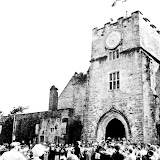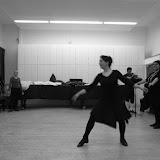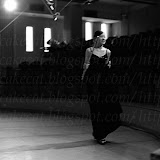Monday, 25 May 2009
Die Kameliendame - Hamburg Ballet
好好看~好像無聲電影~~:P
Lady of Camelias
Lucia Lacarra
Cyrill Pierre
http://www.youtube.com/watch?v=BS_BJtsIXRs
這個美麗的pose比較多~很有"看芭蕾"的感覺 XD
Kameliendame Stuttgart Ballet Marijn Rademake
Sue Jin Kang Marijn Rademake
Kameliendame Male Solo Marijn Rademaker
Kameliendame Male Solo Marijn Rademaker
Sunday, 17 May 2009
Benjamin Britten: War Requiem, op.66 -- Concert Review by Bob Briggs
| From Life in London, 2009 |
Benjamin Britten: War Requiem, op.66 (1961/1962): Monica Bancos (soprano), John McMunn (tenor), James Oldfield ( baritone), RCM Chorus (chorus master: Terry Edwards), RCM Junior Department Children’s Chorus, RCM Symphony Orchestra, Martin André, Andrew Gourlay (chamber orchestra conductor), Amy Bebbington (children’s chorus conductor), Amaryllis Fleming Concert Hall, Royal College of Music, London, 5’3’2009 (BBr)
To inaugurate the new concert hall, after a multi million pound refurbishment, the Royal College chose one of the largest works, and one which would involve most of the student body, of one of its most famous alumni.
Before the show, John Forsbrook, Press and Marketing Manager of the RCM, told me that everyone had their fingers crossed for tonight was the first time they’d had an audience in to hear a big show and, as we all know, it’s the sound the music makes in the presence of an audience which is the proof of a new hall. Nobody need have worried, for this new hall, beautiful in its simplicity, white plaster walls, complete with cherubs, a very large stage, high ceiling, with space for an audience of some 500, fully met all the requirements, and even the biggest climaxes – and the War Requiem has a few, especially in the Sanctus and the Libera Me – were heard to full advantage with clear and well focused sound. But even in the tenderest moments, such as the glorious conclusion which brings all the performers together for the only time in the work, the sound was bright and precise. The hall is a triumph and the RCM can be very proud of it, it was money well spent and it will host many superb concerts in the years to come and I, for one, will always be looking forward to my future visits there.
But this isn’t Architectural Digest, this is Seen and Heard so what about the music?
The War Requiem is Britten’s biggest non–operatic work and at its première, in Coventry Cathedral in 1962, it was hailed as a towering masterpiece, but time hasn’t been too kind to it. Although there are many fine moments, there are some cringingly embarrassing sections – the duet for the men setting Owen’s The Next War is a poor relation of the Kanonen Song from Die Dreigroschenoper, the Balinese bell sounds at the start of the Sanctus seem precious rather than incantatory, and the rather obvious word painting, such as the music accompanying the line:
The shrill, demented choirs of wailing shells
– but as a whole the work still packs a big emotional punch and tonight’s performance left a capacity audience open mouthed and, literally, dumb struck at the power of the utterance.
In overall control was Martin André, who conducted the huge orchestra and full chorus, joined by the full throated soprano Monica Bancos, in a performance where he let the music speak for itself and its emotion was felt without any extra help from the musicians. Theirs was a superb contribution, and although this is a choral work there is plenty for the band to do. The brass in the Dies Irae was awe inspiring when sounding the final trump, and there were valuable contributions from the winds and lots of, perfectly placed, percussion. If the strings don’t do what they usually do – that is play and sing big melodies – it’s simply because this isn’t that kind of piece.
The chamber orchestra, seated at right angles to, and in front of, the main body, was conducted by student conductor Andrew Gourlay who, together with his male soloists, had the difficult task of bringing Wilfred Owen’s poems to vivid life, and they did it magnificently. This really is a man’s work, that is it is the two male soloists who really carry the argument of the music. Tonight we heard two fabulous young singers – tenor John McMunn and baritone James Oldfield – who breathed new life into this difficult and sometimes harrowing music. McMunn, in particular, displayed a glorious sense of feeling and understanding of his music, never overstating what he sang and employing a wide range of tone colour. Oldfield was no less impressive, he has more argumentative music, and he stamped his own personality on every note he sang. When they came together at the end in the passionate lullaby Let us sleep now, it was almost too much to bear as we realised the full horror of their situation:
I am the enemy you killed, my friend,
I knew you in this dark, for so you frowned
Yesterday through me as you jabbed and killed,
I parried; but my hands were loath and cold.
Special mention be made of the children’s choir, seated in the gallery, whose small, but valuable contribution, was most telling, and the full choir, trained by Terry Edwards, surely this country’s best choral director, was excellent.
A flawed masterpiece, to be sure, but with a performance as assured as this we can only appreciate Britten’s brave attempt at showing us the full horrors of war and the effect it has on mankind. Also, listening to these young musicians I know that the future of the performance of classical music is in very safe hands. Well done, RCM, this was a triumph and long may we be privileged to hear more of this calibre of music making from the same source.
Bob Briggs
Subscribe to:
Comments (Atom)
Image works are licensed under a Creative Commons Attribution-Noncommercial-No Derivative Works 2.5 Taiwan License.
Text works are licensed under a Creative Commons Attribution-Noncommercial-No Derivative Works 2.5 Taiwan License.









